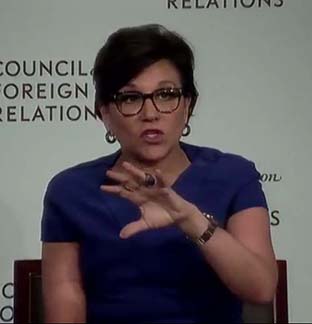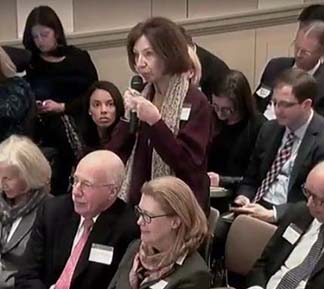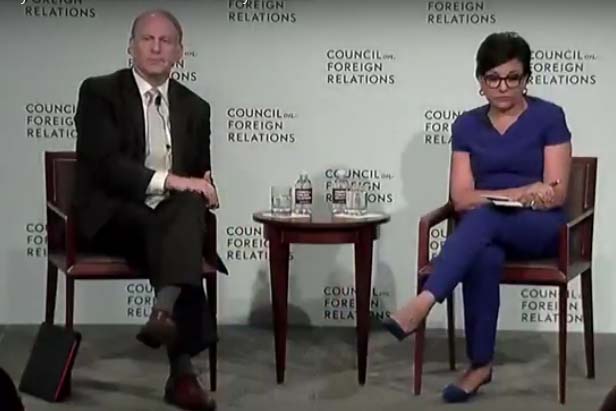By Lucy Komisar
April 7, 2016

Secretary of Commerce Penny Pritzker appeared at the Council on Foreign Relations a few days ago and treated the members to misinformation about the proposed Trans Pacific Partnership, which is being promoted by President Obama and corporate America as a free trade benefit.
Pritzker, whose father was a co-founder of Hyatt Hotels, built on the family fortune and connections to found PSP Capital Partners and Pritzker Realty Group. Last year, Forbes estimated her net worth at $2.4 billion. She was a major contributor to the Obama presidential campaign.
Opposition to TPP has swelled as the public found out the details of the treaty which was negotiated in secret, with input only from corporate representatives, and not even made available to members of Congress. Much of it was revealed by Wikileaks. With the support of Republicans and some Democrats, Congress agreed that when it is voted on, no amendments will be permitted. Speculation is that it could come to a vote after the elections. Candidates Sanders, Clinton (only recently) and Trump oppose it.
Pritzker said in her remarks at the April 4th event that critics were “not telling an accurate story or telling part of the story and blaming trade for something that‘s larger.”
So, in a question, I pointed out that “I heard a lot of facts that I thought were misstated from your presentation.”

The investor-state dispute settlement (ISDS)
I said, “….you didn‘t mention the issue which is really roiling the opposition, which is the investor [-state] dispute resolution mechanism, which many people feel would really destroy a national”an American sovereignty when companies could say, this law, which is for environmental protection or health protection or worker protection, would cost our company a lot of money”such as fracking in Oklahoma [which] causes earthquakes”and therefore, you have to pay us millions, even billions of dollars for the money that we would lose. You didn‘t address that and I wish that you would.”
She replied, “You know, investor-state dispute resolution is as much a protection for American companies around the world as it”and for any time that investor-state dispute resolution has been used against, let‘s say, an interest in the United States, they‘ve lost and the United States has won. So I don‘t see that it makes us more vulnerable. What it does is give our American companies greater rights in countries around the world that don‘t have the kind of judicial system that we have.”
Is something wrong with the Canadian judicial system? Canada, which banned the export of toxic PCB waste to comply with the Basel Convention, under NAFTA’s ISDS had to pay $20 million damages to S.D. Myers, an American waste treatment company operating in Canada. ISDS cases are on the rise. By 2012, there were 500. Of the 244 that were determined, 42 percent were won by the host government and 31 percent by investors. It’s only so much time before the U.S. loses one. Though one could say that the people all lose when environmental regulation is destroyed.
And, of course, such “protection” would finesse the U.S. judicial system she admires, since disputes would be handled by three arbitrators, one chosen by the investor, one by the country being sued, and the third by agreement of the other two. They would be international trade and investment lawyers whose main job is working for corporations.
“Don‘t let rhetoric get out of hand”
Two others in the audience raised the treaty issue. Responding to Italian journalist Gianni Riotta‘s question about the status of TTIP, the European version of the treaty, Secretary Pritzker declared “…are there, in certain countries like Germany or Austria, a lot of public outcry about TTIP? Yes, but the negotiations continue. And one of the things that we are working with our European partners is to not let the rhetoric get out of hand in these countries.”
The rhetoric? What does it mean the U.S. is working to not let the rhetoric “get out of hand?” Does she mean not let public discussion “get out of hand”? How would the administration do that?
I was sitting next to a retired lawyer from a prominent white-shoe firm who commented that he had never read about the investor-state dispute resolution in the papers. He probably reads the New York Times and the Wall Street Journal, and no, those papers frame the issue as one of free trade, not loss of sovereignty.

I suggested in my question to Council President Richard Haass, “On the issue of TPP, this is the first time that I can recall that it‘s even been mentioned on this platform. And I would suggest to Richard it‘s time that we had a debate with a critic and a supporter of TPP. There are plenty of critics.” I hope the Council holds such a meeting, as it looks bad to avoid the issue, even if it might upset powerful corporate members.
How TPP “helps” Vietnamese workers
Mike Posner, former Undersecretary for Democracy, Human Rights and Labor in the Obama administration and now co-director of the Center for Business and Human Rights at NYU‘s Stern School of Business, in his question noted that “a lot of people are skeptical about whether the Vietnamese, who are like the Cubans, who are like the Chinese”it‘s a central state economy. There‘s one union. They‘re not likely to be very easily persuaded to open up the system.” He asked, “What do you say to people who are skeptical about how TPP is going to be implemented with regard to the labor provisions, especially in Vietnam?”
Pritzker replied that “Vietnam, you know, is very supportive of being part of TPP. Their government acknowledges what they‘ve agreed to and the lift that‘s necessary for them to be compliant. What we‘re trying to do is give them technical assistance to actually achieve that. You know, the proof will be in the pudding, as it always is, but, you know, their government wants”they see that to benefit their own populace and their own labor environment by elevating standards. And instead of them being, you know, a place where you can outsource your production because of the poor labor standards, they‘re trying to improve that for their own population‘s benefit.”
Obviously, the leaders of Vietnam have been trying to achieve all kinds of improvements for their population‘s benefit. That includes imprisoning independent labor leaders.
Last year, a group of independent Vietnamese labor leaders sent a letter to Congress saying the TPP would destroy efforts to improve workers‘ rights in their country. They said, “The U.S. Congress should not cast away its leverage to push for such reforms by passing fast track.” And, “Promises of future reforms by the Vietnamese government should not be trusted. If fast track were passed before the above abuses are actually stopped, the hope of any real reprieve for Vietnam‘s oppressed workers would fade.”
The 18,000 tariffs red herring
One of the other distorted “facts” was Pritzker‘s assertion, “How can you possibly deny helping American companies have access to the fastest-growing markets in the world? I mean, TPP reduces 18,000 tariffs in the Asia-Pacific region.”
According to Public Citizen, the leading analyst of TPP/TTIP, the 18,000 is a red herring, with the U.S. having significant trade in less than a quarter of the categories. Public Citizen says:
“The administration has tried to shift focus to a “tax cut” narrative to sell the TPP with a mantra about 18,000 tax cuts for U.S. exported goods. But last year, the United States exported goods in less than half of the 18,000 tariff categories.
By using the raw number of tariff lines cut with respect to the five nations with which we do not already have FTAs (Japan, Malaysia, Vietnam, New Zealand and Brunei), the administration distracts from the real question: Do 18,000 tariff cuts equate to more U.S. exports or jobs?
For the nearly 7,500 categories of goods out of the claimed 18,000 for which we did sell anything, almost 50 percent had sales under $500,000. Many items we simply do not sell, including those that the administration claims the TPP‘s weak environmental chapter will help conserve.
Among the 18,000 tax cuts are Malaysia‘s shark fin tariffs, Vietnam‘s whale meat tariffs and Japan‘s ivory tariffs. The administration‘s “TPP Guide to 18,000 Tax Cuts” also bizarrely highlights goods TPP nations simply do not buy in volume from anyone.
Consider the 34 percent “tax” cut by Vietnam on Alaskan caviar. In 2014, Vietnam‘s per capita GDP was about $2,000, and about $150,000 worth of caviar was imported by Vietnam from anywhere. Or Vietnam‘s 5 percent tariff on skis from Colorado. Vietnam imported only about $50,000 in skis in total.
Other highlights: Vietnam and Japan will eliminate their tariffs on silkworm cocoons, Brunei will cut its tariff on ski boots and Vietnam will eliminate its tariff on camels. Almost 2,000 of the tariff reductions in the products we do sell won‘t be realized for over a decade or more, including beef and pork to Japan.”
The Obama administration‘s rhetoric has gotten out of hand.
Click here for meeting transcript, audio and video. Lucy‘s question is at 48:45 minutes in.


The use of the term “rhetoric” by the Secretary in this context seems a bit canned, as though it is a code word inserted where “transparency” would otherwise fit. In my experience, substitute words are used to divert attention away from the real problem. If we can believe that the issue is in the language or terminology, then we can believe that everyone is on the same page, heading in the same direction. As Ms. Komisar points out, there is clearly more than rhetoric at stake and the Pipeline is just the latest example of the diminution of hard-won rights.
Great article. Bravo.